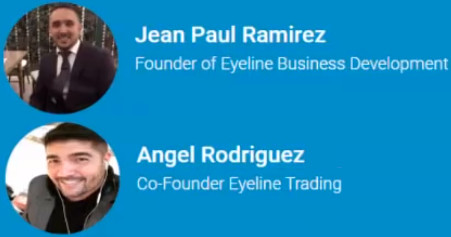
The SEC alleges the defendants defrauded consumers out of at least $12 million through cryptocurrency securities fraud.
In addition to the primary individual defendants named above, the SEC names Putnam’s seventy-six year old father, Richard T. Putnam, as a relief defendant.
The SEC alleges Richard Putnam received money obtained through fraud through R & D Global LLC.
At issue is Dan Putnam’s long history of creating and promoting MLM Ponzi schemes.
Jean Ramirez lives in Columbia and is cited by the SEC as Putnam’s partner.
Angel Rodriguez resides in Utah and is an “interpreter and intermediary” between the two.

WealthBoss flopped and was merged into the Onyx Lifestyle Ponzi scheme. Onyx Lifestyle is not mentioned in the SEC’s complaint.
Each of the Ponzi schemes detailed in the SEC’s complaint pertain to cryptocurrency related securities fraud.
Putnam, through Modern Money Team, touted that investors could “purchase mining machines, run them in [Modern Money Team’s facilities], and earn money on the profits each month.
Investors were told they could expect to earn profits from the successful mining of digital assets by the mining operation.
Putnam raised approximately $3.25 million through the sale of mining machines and participation in the mining operation to nearly two hundred investors.
Among the mining operation investors is D.B., who invested over $600,000, purportedly in exchange for nearly 500 mining machines and the profits that would be generated by the mining operations, which were to be stored remotely and operated by or under the control of Putnam.
D.B.’s machines appeared to be operating for several months, during which time D.B. received weekly payouts that were displayed on his Modern Money Team back office site, a website interface where investors could monitor their purported profits.
D.B. generally reinvested his profits to purchase more machines.
In or around November 2018, D.B. stopped receiving payouts, and Putnam told him that, due to the drop in price of digital assets, mining was no longer profitable.
D.B. began requesting that he take physical possession of the mining machines he believed he had purchased, but, over the course of several months, Putnam gave excuses for why D.B.’s machines could not be delivered to him.
Eventually, in February 2020, Putnam told D.B. that he could pick up his machines in Salt Lake City, Utah.
Upon information and belief, D.B. has still not obtained physical possession of any mining machines from Defendants.
After Modern Money Team’s mining Ponzi ran its course, Putnam and Ramirez launched trading packages.
Beginning with Modern Money Team, and then later with Eyeline Trading and WealthBoss, Putnam began offering trading packages to investors.
Putnam represented that the trading packages derive profits from digital asset trading and arbitrage activities being conducted by “professional traders that are constantly monitoring the news in anticipation of price fluctuations that could create profitable trading opportunities.”
Putnam further told investors that their funds would be held in Bitfinex trading accounts controlled by Ramirez, who was responsible for conducting the trading.
One investor presentation stated that investors can “[e]arn regardless of what’s happening in the market.”
With regard to the packages promoted through the Eyeline Trading MLM, Putnam represented that the packages were “individual accounts” that are “not pooled” and that investors can “start . . . or stop at anytime” or “withdraw [their] principal at anytime.”
To purchase the trading packages, some early investors wired funds or deposited cash into Putnam’s personal bank account and bank accounts for MMT Distribution, LLC. Putnam was then to convert the fiat currency into digital assets, which were then transferred to Ramirez who would use the funds in his trading activities.
Eventually, Putnam began requiring investors to purchase the trading packages with digital assets.
Until November 2019, investors’ back offices showed weekly gains, and investors were able to make periodic withdrawals from their accounts.
In November 2019, however, the Putnam MLMs stopped making the purported profit payments to investors and trading activities appeared to cease.
Putnam told investors that Bitfinex had put a freeze on Ramirez’s trading accounts, thus ceasing Ramirez’s trading activities and shutting him off from access to the funds held in those accounts.
Since that time, investors have received no return on their investments and have been unable to make any withdrawals of principal or purported profit.
One group of investors, recruited by an individual cited as “J.A.”, collectively invested $7.2 million in Putnam’s schemes.
Putnam managed the weekly withdrawal requests from the J.A. group of investors.
These withdrawals were consistently delayed and Putnam frequently made excuses for why withdrawals could not be made on time.
As with the Putnam MLM investors, J.A. and his group of investors were no longer able to access their investment funds beginning November 2019.
To reveal the Ponzi nature of Putnam’s schemes, the SEC subpoenaed Bitfinex for details of the alleged frozen account.
In or around January 22, 2020, Putnam told Modern Money Team investors that the Modern Money Team Bitfinex account held approximately 260 bitcoins.
Additionally, back office records for the J.A. group of investors showed that, as of November 2019, those accounts held a combined total of 2061.2951 bitcoin, which Putnam represented were being traded in accounts controlled by Ramirez at Bitfinex.
In reality, Bitfinex records show that Ramirez had just one trading account, which never held more than 50 bitcoin at any given time, and that was closed in or around May 2019.
So what actually happened with the money that was invested into Putnam’s schemes?
Well, like and other Ponzi scheme he and Ramirez misappropriated it.
According to Putnam’s own account of his agreement with investors, Putnam was not entitled to any portion of investors’ principal investment, but instead was to be compensated only though profits derived from the trading activities.
Bank records also demonstrate misuse of investor funds.
In one instance, two investors deposited funds totaling $112,500 into the MMT Distribution, LLC bank account between August 7 and August 8, 2018.
Bank records do not reflect that those funds were exchanged for digital assets.
Instead, on August 15, 2018, Putnam wired $105,273 from the account to purchase a condominium in his name in Cedar City, Utah.
Similarly, on January 26, 2018, Putnam’s personal account had a balance of $8,914. Between January 29 and February 8, his account received four investor deposits totaling $28,500 and one transfer of $34,000 from another entity he controls VIP Deals, LLC, for total deposits of $62,500.
During the same time period, Putnam transferred $13,000 back to VIP Deals, LLC, purchased a $33,827 spa and made numerous personal purchases.
Putnam did not use funds as represented. Instead, Putnam used investor funds to purchase a condominium and to pay for other personal expenses
In addition to running a Ponzi scheme, the Modern Money Team, Eyeline Trading and WealthBoss income opportunities were all unregistered securities offerings.
Putnam represented to J.A. that the trading packages were SEC compliant.
Contrary to this representation, Putnam filed no registration statements with the Commission with respect to the trading packages, nor had he taken any other steps to assure compliance with Commission statutes or rules.
Rather, the trading packages were not compliant because they were offered and sold in unregistered offerings and were not subject to an exemption from the registration requirements of the federal securities laws.
Whether our reviews pointing out securities fraud in each and every one of Putnam’s schemes had any effect I can’t say, but both Putnam and Ramirez were well aware of what they were doing.
In or around February 13, 2019, Putnam stated to Rodriguez, “We are going to bring Jean Paul [Ramirez] so much money this year . . . We are either going to retire this year or go to jail . . . And Im [sic] still not sure any of it is real.”
In subsequent WhatsApp communications, Putnam
(1) discussed with Rodriguez buying “a beach house in another country in case we have [to] flee,”
(2) stated, after being frustrated with Ramirez’s failure to make payouts, that it “[j]ust seems like Jean Paul might be running a ponzi,” and
(3) expressed that he was “pretty much 100% [Jean Paul] is a scammer.”
Additional WhatsApp communications demonstrate Putnam’s and Ramirez’s actual knowledge that Ramirez was making Ponzi-like payments.
In or around July 22, 2019, Rodriguez stated, “I talked to [Ramirez] and he told me he was going to have [the payments] today but he needs to be careful because he is going to be paying from principal” and thus would not “have anything to trade later.”
It really doesn’t get any more clear cut then that.
Claims for relief cited by the SEC include violations of the Securities and Exchange Act.
The SEC is seeking a permanent injunction against the defendants, disgorgement of ill-gotten gains and a civil penalty.
Stay tuned for updates as we continue to follow the case.
Update 7th June 2020 – As per an ex-parte May 7th order, the SEC was awarded an asset freeze against the defendants.
Update 23rd April 2021 – Citing COVID-19, the complexity of discovery that comes with crypto fraud, and involvement of “as many as 50 third-party witnesses”, the parties requested entry of an amended scheduling order on April 7th.
The Parties have been diligent in conducting discovery. They have propounded written discovery and have served numerous third-party subpoenas.
Yet the Parties still have significant discovery still to conduct including obtaining additional documents from third parties and completing as many as 15 depositions.
The court granted the requested amendment later the same day.
As per the order, a scheduling hearing has been set for January 12th, 2022.
Should the case not be resolved via settlement, it’s expected a trial will take place later in the year.
Update 13th August 2022 – Dan Putnam’s securities fraud case has been pushed back into 2023.
